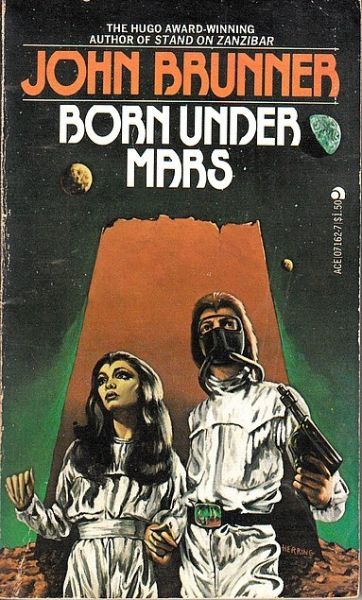Dream of Distant Places
Born Under Mars
By John Brunner

27 Jun, 2023
0 comments
John Brunner’s 1967 Born Under Mars is a stand-alone science fiction novel of interstellar intrigue.
Mars-born engineer Ray Mallin is an expert in four-space engines, which makes him a useful crewmember on superluminal starships. Mallin is not engaged in any form of espionage, which makes his current circumstances — being tortured for information by people in masks — hard to explain.
There are three significant human factions in the galaxy of tomorrow. Toward the constellation Ursa Major (north)1, the planets settled by the cheerful anarchic Bears. Toward the constellation Centaurus (south), planets settled by the grim, regimented Centaurs. Between them lies Earth, officially neutral but privately pro-Bear.
Mars is part of Earth’s sphere of influence, to a great extent despite their assertion of independence. The Martians have adapted to living on a hostile world only to find their achievements rendered irrelevant by FTL drives; they continue to insist that they are a people apart. Still, the stiff-necked Martians do have common ground with Earth, which may explain why the majority of Mallin’s career was spent in Bear space.
Having unwisely ventured into Centaur space, the mismatch between Mallin’s Martian culture and Centaur inflexibility landed Mallin on the beach, lucky not to have been discarded in deep space by an irritated captain. Mallin might have languished on a Centaur world for the rest of his life or worse, been forced to appeal to Earth charity, had he not lucked into a position on Captain Lugath’s ship, the Hippodamia.
Unbeknownst to Mallin, who preferred to focus on the four-space engines under his command, the Hippodamia carried a most valuable cargo, one on which the fate of all humanity may depend. Many factions are determined to get their hands on the cargo. Most of them are convinced that Mallin can facilitate acquisition. Thus, capture and torture. Thus, the adventures that follow once Mallin escapes his captors.
If only Mallin had the slightest idea what was going on….
~oOo~
Other authors like Burroughs and Bujold that I will not name sometimes rely on the most outrageous coincidences. At first glance, Born Under Mars also seems to depend on some unlikely coincidences that place Mallin at the center of events. Many of them turn out to be driven by Brunner’s worldbuilding. Mars is a very low population world where the odds that any two Martians are somehow connected are good. Mars cities being so small, encountering someone by accident is quite likely.
Something I noticed last month, while looking over my Brunner collection: most of the series he wrote were of novellas or shorter pieces. His novels, with few exceptions, were stand-alone.
Reading Brunner’s essays on his own career, as well as Jad Smith’s monograph John Brunner, makes it clear that Brunner was unhappy in his career. He was forced to write at furious pace to support himself, with his more ambitious (and more time consuming) projects failing to produce financial results commensurate with the work he had invested. Though … it seems odd that Brunner by and large avoided novel-length sequels, which have been quite lucrative for other authors.
While Born Under Mars and last month’s Brunner review of The Long Results are set in different futures, the two books share certain themes; a determination to model and shape human destiny. In this book, the powers-that-be noticed (centuries ago) that human civilization was too homogenous. Without experiment and variation, humanity might stagnate . The Bear/Centaur dichotomy was created as a way out of this trap.
I’m reminded of other SFF works about seeing the future and trying to shape it. Works such as Asimov’s Foundation series and the Dune books. But aren’t such efforts doomed? The people who create the models predicting doom are themselves immersed in the societies they want to shape. How can they have any objectivity at all? How can their models account for the randomness of history? Note that in both the series that I mentioned, prediction went off the rails after a certain point, one because of an Outside Context Problem and the other because it succeeded all too well.
Brunner accepts the Foundation-esque model as valid and looks for drama on a more personal level. Mallin belongs to the ranks of poorly informed protagonists who stumble into situations they do not understand. Their adventures are driven by the need to learn on their feet faster than the potentially lethal consequences of ignorance catch up with them. The novel is mainly a fast-paced adventure novel, although Brunner does try to add another level with what another author called “psychohistory” angle.
Born Under Mars is available here (Amazon US), here (Amazon Canada), here (Amazon UK), here (Apple Books), here (Barnes & Noble), and here (Chapters-Indigo).
1: North (and south) from a strictly terrestrial perspective. The Bears appear to take their name from the viewable from the northern hemisphere constellation Ursa Major, while the Centaurs take theirs from the southern hemisphere viewable constellation Centaurus. For too many reasons to get into here, the naming convention must be figurative and not literal.
